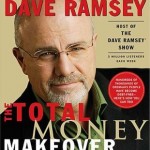Dave Ramsey is a genius. Have you ever listened to him or read any of his books? He really can break it down and tell you all about how to spend and how to save. I read his book, Total Money Makeover a few years ago and am now completely out of debt except for a home mortgage, and I hope to have that paid off in less than 10 years. If I was much more strict with my money, I’m sure it would have already been paid off by now, but I want to enjoy a few things too. I could be dead in ten years after all! So, if you are looking for a common sense way to get out of debt, I would totally recommend the book.
Today however, I am going to repost an article he recently wrote about the four types of insurance policies you must have. The one thing I would like to add before you read this is that if you are under the age of 45, I would strongly urge you to stock up on all the life insurance you can afford, because once you turn 50, insurance companies aren’t so willing to insure you anymore. TRUST ME. I guess that means the odds are against us once we hit 50 that are days are numbered. And since I’ve hit it, it’s one of the reasons I don’t follow Dave’s plan to strictly. But it’s not to say that he didn’t really help me focus on my debt and get it paid off. Cars, credit cards, etc., awhile also focusing more on savings and retirement. Ok, now I’ve wandered off the subject again. Here’s the article:
Four Must-Have Insurance Policies
Just because some aspect of money isn’t talked about much, doesn’t mean it’s not important.
It’s obvious that a budget or a debt snowball need to be checked frequently to make sure that you’re sticking to them. If stuff like that gets away from you, it can turn bad quickly. Make sure to refresh yourself on these four insurances:
Life Insurance
If you die with no life insurance, your family will most likely be stuck in a dire situation and have to make drastic changes, all the while grieving you. You should have eight to 10 times your yearly income set aside in a term life policy. That way, if you pass on, your family can invest the money and, at a 10% return, replace your income.
This is something that shifts more often than you think. Every time you get a raise, have a child, buy a house or have some other significant life event happen, you need to make sure that you have enough insurance to cover it. Don’t take this lightly; one-third of adults in the United States carry no life insurance, and more than half a million in the prime of their lives die prematurely each year.
68 million Americans have no life insurance at all. That’s the equivalent of every man, woman, and child in the green-colored states.
Long-Term Disability Insurance
If you die, your life insurance will take care of your family. But if you are permanently disabled, you will be unable to produce an income and yet still need to be cared for. In that case, you need long-term disability insurance that will provide about 70% of your income for an extended time period, usually until death or age 65.
You can usually get it the cheapest through your workplace. And you need to. About 49 Americans become disabled every minute and three in 10 in the workforce today will become disabled before they retire. With the average monthly benefit from Social Security disability being $1,004 a month, you can’t afford to not have this type of insurance.
In the past hour, almost 3,000 Americans became disabled. That’s 49 every 60 seconds.
Long-Term Care Insurance
This isn’t necessary until you hit age 60. After that it becomes vital. A nursing home can cost about $50,000 a year per person. If you and your spouse go into an assisted living facility with $300,000 in life savings, you’ll have it used up so fast you won’t believe it.
If you are approaching 60, start looking at long-term care insurance. Don’t buy it before then (it’s not necessary enough at that point) or after (it can get too expensive).
Homeowner’s/Renter’s Insurance
You should never own or rent property without having yourself covered in the case of a fire, flood, burglary or some other disaster. Renter’s insurance is relatively cheap to get, so make sure to have some.
When buying homeowner’s insurance, get one that has guaranteed replacement costs. If something happens to your home and you have a policy without guaranteed replacement costs, you will only be covered for the value of your home at the time you took out the policy. That’s bad news if your house has increased in value. Make sure to have your full emergency fund in place so you can take the lower premium and higher deductible on it.







